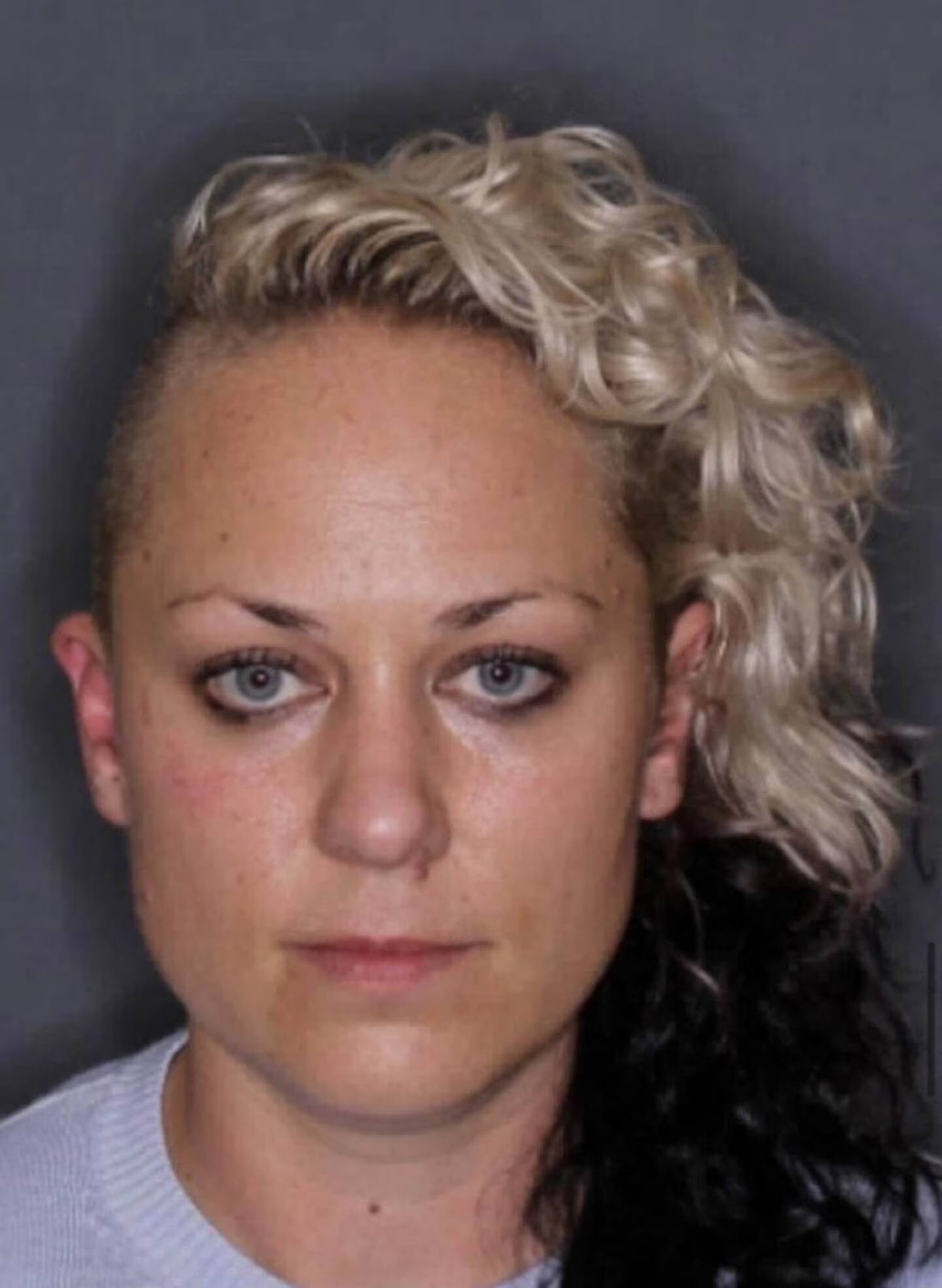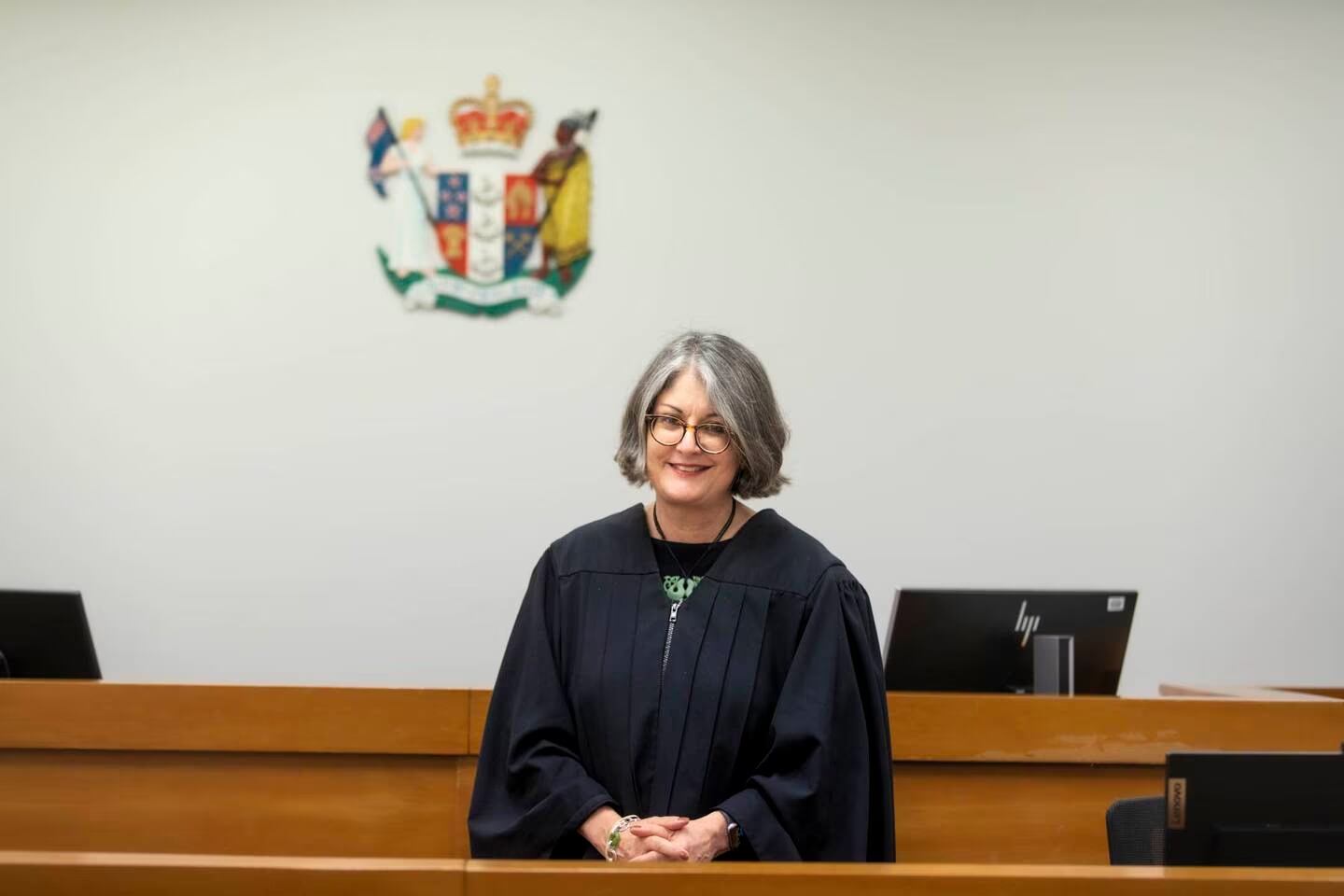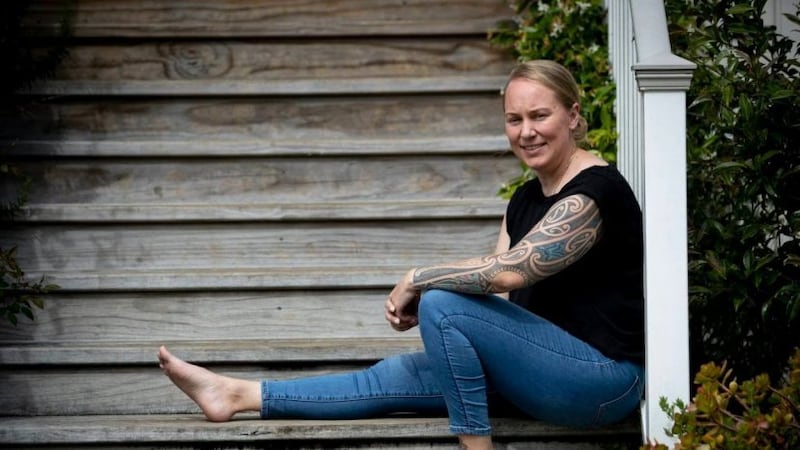Shannan Hill: mother, clinical case manager, recovering addict. Photo / Dean Purcell
Shannan Hill was caught in a revolving door of arrests and jail time until the Alcohol and Other Drug Treatment Court struck fear in her and used its powers to make her stop.
The year was 2016, and Hill woke up to three police officers standing in her bedroom yelling her last name. “Come on, get up. You’re off!” she recalls them saying.
“I was like, ‘Far out, it’s early as. Let me get dressed!’”
She was 31, a daily user who shook and couldn’t move or talk if she didn’t have her drugs. She robbed homes, took from supermarkets, and stole cars - with a crowbar in the most recent incident - anything she could get her hands on to fund her habit.
She got up, grabbed her cigarettes and lighter, $20 for her taxi ride home and followed the officers down to the police station. She knew the drill - go in, get bail, come back and do the same thing, repeat.
“I could always sort of make the judges feel sorry for me, or you know, spin a yarn, and I’d always manage to get bail,” she said.
Not this time. After years of troublemaking, police finally opposed bail.
In the cells, her lawyer tried to get her to sign the papers for a rehab facility. “Shannan, you’ve got a problem,” he told her.
She threw the papers and railed at him. “I don’t have a problem. You’ve got a problem. Just get me out of here!”
“I was arguing with him and blaming him, blaming the world. I always had my finger pointed outwards.”
Hill would later become a success story of the Alcohol and Drug Treatment Court, a model born in the United States and adopted in New Zealand to deal with hardened offenders that jail and punitive sentences have failed because their addictions remained unaddressed. It uses the coercive powers of the criminal justice system to hold people to account and commit them to treatment.
Dead on the side of the road
Hill had her first drink when she was 11. She went with two older boys from school to a house where beer was provided, took one and kept going. Her stepfather managed to track her down and bring her home. That night, she wet the bed.
“I was in such a mess,” she recalls.
She had a loving mother and stepfather but felt abandoned by her biological father. Interfered with by a family friend when she was six, she slept in her mother’s bed until she was 10.
“I hated the world, I hated feeling unsafe, and alcohol took that away momentarily.”
That was the start of 20 years of addiction. She tried meth at 18 and was instantly hooked. When the meth high was no longer good enough, she added gamma-hydroxybutyric acid (GBH), a sedative also known as ‘wazz’ or ‘fantasy’, which would knock her out.
“I counted six times I’ve been found on the side of the road or at a dairy with no heartbeat, so it can kill you. I’m very, very lucky that stuff didn’t actually kill me.”
To fund her addiction, she turned to crime.
In 2014, she was arrested and sentenced to home detention on 22 charges. For six months, she pretended she was clean to her family and probation officer but was using the whole time. At the end of it, she got off the electronic bracelet and went straight back to what she had been doing beforehand.
She gradually lost her family, friends, and custody of her two sons. Even her mother gave up.
“When I was in the heart of my addiction, she sold our family home and moved to Australia to get away from watching what I was doing to myself.”
Between 2014 and 2016 she clocked up another 21 charges, more theft and robbery, including the incident with the crowbar. Her family nearly celebrated when she went to jail in December 2016.
At least they knew where she was - that she was clean, sober, and safe.
‘It scared me’
Jail was a hard place for an addict after five years of daily solid drug use. No medication, and no help for the withdrawal, or the boredom.
“You’re in your cell 23 hours a day. You might get an hour out in the wing if you’re lucky,” she recalls. “You might have a really thin mattress that you can fold the end of to make a pillow-type situation.”

A police mugshot of Shannan Hill after her arrest in 2016. Photo / Supplied
She managed to get phone calls approved and called her children. Her youngest, then six years old, asked, “Mummy, are you on holiday?” She doesn’t remember the rest of the call, only the shame, embarrassment, hurt, and sadness. When they hung up, she burst into tears.
“I just dropped to the ground wailing.” Prison guards had to escort her back to her cell.
That phone call was a moment of realisation. Because of what she had done, she would be left in jail. She had already missed out on her two beautiful boys all this time.
“So if I continue to do these things, I’m going to continue to end up back here. It scared me.”
About two months into custody, she found out about the drug court from a fellow inmate. Hill had no idea what it was but heard that it meant bail.
“I was like, ‘Straight-up, how do I get in there?’”
She called her lawyer, who looked into it and raised the matter at her next court hearing.
“The judge said to me, ‘I can sentence you today, or I can send an application over to the drug court for you’.” He did.
‘I never thought I was a slave to drugs’
New Zealand’s Alcohol and Drug Treatment Court started as a pilot in 2012 and was made permanent in 2019, targeting addicted offenders who would otherwise be jailed.
Sentencing is deferred while participants go through a rigorous treatment programme including frequent court appearances and drug testing over one to two years.
It sits at the Waitākere, Auckland and, since 2021, Hamilton district courts. To qualify, offenders have to be 17 or over, have a substance use disorder driving their offending and they must have resolved all active charges. They must not be facing sexual violence, serious violence or arson charges, and should not have serious mental or medical health issues that prevent them from participating fully.
A first appearance at the drug court is like an interview. Hill was nervous, questions zooming around in her head. “Are they going to accept me? Do I meet the criteria? Do they have places?”
She was lucky. The court exited someone that day, opening up a slot. She burst into tears in the dock, humbled and grateful. “The system I’d fought against for so long was giving me a sense of hope.”
Her whānau came through for her, her ex-mother-in-law offering her a bail address. Participants who do not have one are found a suitable address, usually at a shelter where they can be supervised.
Hill started going to daily Narcotics Anonymous meetings, followed by a woman’s recovery camp, and finally, an 18-week residential programme at drug rehabilitation trust Higher Ground. Until then, she had never done anything to try to get better.
“I thought I could give up myself. I never thought I was a slave to drugs.”
In treatment, she had to face herself, her charges, and the destruction she wreaked on her family.
In victim impact statements read out to her, she heard her little sister say she felt like her childhood had been stolen because their parents’ attention was always on Hill and her troubles. She heard her stepfather say the house never felt safe because of the people she associated with and brought home.
“That was the hardest because I couldn’t run and use [drugs] to make those feelings go away. I couldn’t hide.”
She spent a year in post-treatment, and her family started coming back into her life. Her sons came to stay on the weekends. She went for lunches with her sister, stepfather and stepmother. The day before her graduation from the drug court in August 2018, her mother flew in from Australia to surprise her.
High-risk, high-needs
There was a lot of love in Hill’s upbringing in West Auckland. A kind, caring and relaxed mum and a stepdad who taught her practical things like how to build a fence and change a tyre. She learned good morals - don’t steal, don’t hit.
“And those, I tell you, flew out the window real quick when the drugs came. I just didn’t care,” she recalls.

Waitākere District Court Judge and co-founder of the Alcohol and Drug Treatment Court Lisa Tremewan. Photo / Michael Craig
Waitākere District Court Judge and drug court co-founder Lisa Tremewan says the vast majority of offenders who enter the drug court have suffered severe trauma, often directly or indirectly at the hands of the state. There are some who come from supportive backgrounds like Hill’s but they are rare.
“Those who had supportive upbringings are rare in the court - they stand out, though often they, too, have had experiences which have led to their addiction. They need to find other ways to deal with their issues and take responsibility for themselves,” she said.
The drug court becomes a circuit-breaker, where participants are given intensive treatment and other services, supervised by a team made up of the judge, prosecutor, defence lawyer, clinical case manager, peer support worker, and the Pou Oranga, a Maori cultural adviser.
Participants are regularly drug tested. They have to be clean and sober the whole time but the possibility of relapse looms large.
Not everyone does but those who graduate receive a community-based sentence, not prison, and continue to be monitored by a probation officer who reports regularly to the judge.
Those who leave the programme before graduation return to the traditional courts for sentencing, where they could still get credit for any meaningful progress they made in the drug court.
Tremewan says this is a tough group to work with and the drug court is not a magic wan, but research shows the model is most effective on high-risk, high-needs offenders with unaddressed substance use disorders that put them in a revolving door of offending - getting punished, then going straight back to re-offending. The court offers them what she calls a balance of hope and accountability.
The house that lifts the spirit
The balance was right for Hill. “I was a wilful, disruptive addict, so the court had just enough leverage over me, and instilled enough fear - healthy fear - in me to toe the line until I wanted to toe the line myself,” she says.
The Māori name for New Zealand’s drug treatment court is Te Whare Whakapiki Wairua - ‘the house that lifts the spirit’. In this court, Hill encountered compassion and encouragement in the criminal justice system, and she was humbled.
“I’m a beat-up junkie criminal, and the judge is saying, ‘We see potential in you, Shannan’.”
As of April 2022, 256 participants have graduated from the drug court, out of the 759 admitted in total (including current participants) since the programme started 10 years ago.
A 2019 Ministry of Justice evaluation found a large reduction in re-offending in the first two years of a participant’s entry into the drug court when compared with matched offenders.
While the benefits declined over longer follow-up periods - still significant within three years, but not at all within four - the report noted significant improvements made since the court began.
“This pattern of decline is consistent with addiction treatment relapse effects, and the need for addiction management is likely to be life-long,” the report said.
Critics of the drug court say it’s expensive.
A 2022 ImpactLab evaluation funded by the Borrin Foundation estimates the programme cost $30,306 per participant. For every dollar spent, the same report notes a double return of $2 in social value - calculated based on a range of outcomes, including reduced offending and victimisation, and improved employment, mental and physical health for participants.
A 2019 cost-benefit analysis by the Ministry of Justice, in comparison, showed a return of $1.33 per dollar spent, in terms of reduced police, court, and prison costs.
The benefits for Hill are clear.
After graduating, she started volunteering and became a peer support worker at the drug court, a job she held for four years until her recent promotion to case manager. Now 36, she is close to completing a degree and runs a busy household with her partner, four of their children and three grandchildren.
Recovery is hard work and she runs a tight ship - no alcohol is allowed in her house, and she won’t even touch the zero per cent stuff. She wakes up every morning with her mind made up to stay in recovery.
“If I’m not in recovery, everything you see, all of my family, my partner and everything I have won’t be here,” she says.
Back when she was in the throes of her addiction, she didn’t care because she had lost everything that mattered anyway. Now, she holds everything a little bit too tight.
“I’ll be in recovery for life,” she says.


